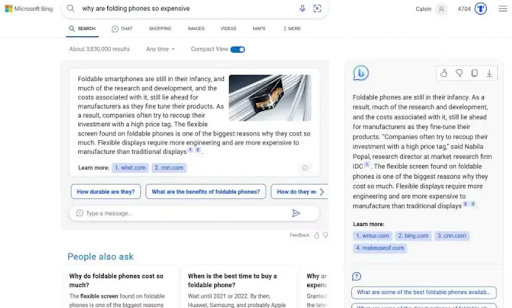Over the years, we’ve seen significant shifts in how search engines deliver results to users, thanks to the rise of artificial intelligence (AI) and changes in user behaviour and Google’s Generative AI is at the forefront of this AI revolution.
Google’s main aim is to give searchers the best and most relevant results possible. Search Generative Experience (SGE), powered by generative AI, aims to do exactly that. We’ll delve into what SGE is, how it operates, how Google’s generative AI differs from Bing and how our team can assist you in keeping up with these search landscape changes.

Google’s SGE aims to provide users with a direct overview of their search topic without the need to click on individual web pages.
SGE can assist users in a variety of tasks, such as finding answers to specific questions, summarising information and providing how-to instructions. The example that we’ve added above shows the results that Google provides if a user searches, “What is Google Bard?”. SGE will generate a list of the three most relevant pages, providing a summary of the three to provide users with a clear and concise answer. It also prompts users to ask follow-up questions for additional information.
SGE is powered by machine learning algorithms and large language models (LLMs). These LLMs analyse the query, process relevant content from various online sources and generate a summary that answers the user’s query.
Although Google’s SGE is dominating the search landscape, it’s important to remember that Bing also has an in-depth generative AI search experience. Bing was the first search engine to introduce generative AI into their search engine.
Whilst the concept of how generative AI works is the same across both search engines, Bing offers an answer box with numbered sources on the right side of the SERP, whereas Google covers the entire page and doesn’t contain clear source links within the text. Bing’s approach to how it displays its AI answer allows users to see the actual search results faster than with Google’s SGE.

Generative AI search offers a range of benefits that make a user’s search experience smoother and more user-friendly. Here are some of the main benefits of generative AI search:
Summarises content directly in the search results, giving searchers a direct and clear answer to your question without having to dig too deep.
Prompts users with follow-up questions, guiding users towards even more relevant and detailed info with just a couple of clicks.
Compiles multiple resources online in a way that is easy for searchers to find the most relevant answers to their queries, without having to analyse multiple pages.
Much like Amazon reviews, generative AI can summarise a large number of reviews into a single, digestible summary of all of the reviews.
While generative AI search offers several benefits, there are also potential downsides that you should be aware of. These include:
As of April 2024, SGE hasn’t been launched in some regions like Europe. This means that users in these regions may not have access to the full benefits of SGE.
Generative AI systems rely on LLM that are trained on vast amounts of data. This means that some results may not be correct or relevant.
We can expect to see a drop in organic clicks and ultimately click-through rate as users have all the information they’re searching for in the search engine results page (SERP).
As SGE provides users with quick overviews of search topics without the need to click on individual web pages, it may result in a decrease in organic traffic for websites.
This means that it’s more important than ever to ensure that your website provides the most high-quality, informative, relevant and engaging content to optimise for shifts in the search landscape.
At Proof3, we have access to various tools and platforms to ensure that you’re providing the best content for users. From keyword research to structured data, get in touch with our team today if you’d like help in optimising your site for SEO.
Note: SGE isn’t replacing traditional search results, it’s simply being added above these traditional results.
As generative AI summarises information across web pages directly in the SERP, we expect to see a 10-20% decrease in organic clicks and ultimately click-through rate. However, users may be interested in your topic of expertise and may decide to engage with other pages on your website.
Although there aren’t any dedicated tools exclusively for optimising SGE, we’ve got a list of SEO tools that we use to assist in the optimisation process. Here are some of the main tools and platforms that we use to help optimise your site:
SEMrush
Google Search Console
Google Analytics
Schema Markup Generators
By using these tools, we can gather valuable insights to help us optimise your website and content to align with SGE. It’s crucial to make the most of these tools and keep an eye on your SEO efforts to stay ahead in the ever-changing search landscape.
